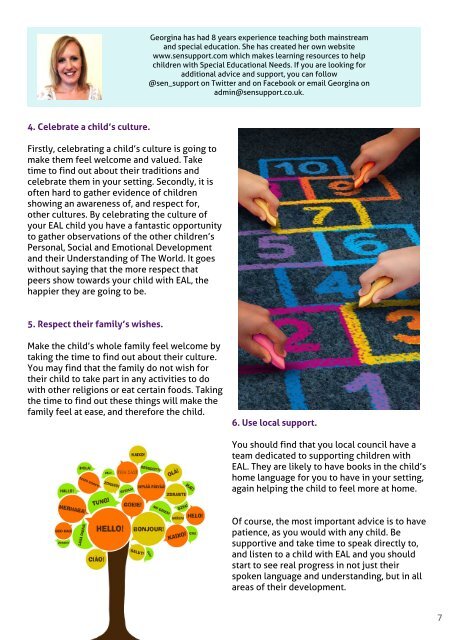volume-three-january-2015
You also want an ePaper? Increase the reach of your titles
YUMPU automatically turns print PDFs into web optimized ePapers that Google loves.
Georgina has had 8 years experience teaching both mainstream<br />
and special education. She has created her own website<br />
www.sensupport.com which makes learning resources to help<br />
children with Special Educational Needs. If you are looking for<br />
additional advice and support, you can follow<br />
@sen_support on Twitter and on Facebook or email Georgina on<br />
admin@sensupport.co.uk.<br />
4. Celebrate a child’s culture.<br />
Firstly, celebrating a child’s culture is going to<br />
make them feel welcome and valued. Take<br />
time to find out about their traditions and<br />
celebrate them in your setting. Secondly, it is<br />
often hard to gather evidence of children<br />
showing an awareness of, and respect for,<br />
other cultures. By celebrating the culture of<br />
your EAL child you have a fantastic opportunity<br />
to gather observations of the other children’s<br />
Personal, Social and Emotional Development<br />
and their Understanding of The World. It goes<br />
without saying that the more respect that<br />
peers show towards your child with EAL, the<br />
happier they are going to be.<br />
5. Respect their family’s wishes.<br />
Make the child’s whole family feel welcome by<br />
taking the time to find out about their culture.<br />
You may find that the family do not wish for<br />
their child to take part in any activities to do<br />
with other religions or eat certain foods. Taking<br />
the time to find out these things will make the<br />
family feel at ease, and therefore the child.<br />
6. Use local support.<br />
You should find that you local council have a<br />
team dedicated to supporting children with<br />
EAL. They are likely to have books in the child’s<br />
home language for you to have in your setting,<br />
again helping the child to feel more at home.<br />
Of course, the most important advice is to have<br />
patience, as you would with any child. Be<br />
supportive and take time to speak directly to,<br />
and listen to a child with EAL and you should<br />
start to see real progress in not just their<br />
spoken language and understanding, but in all<br />
areas of their development.<br />
7

















